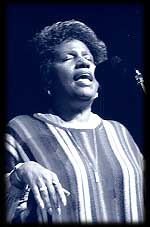
|
|
|
|
|
|
Photo Credit: Tim Owens |
Ethel Ennis
Ethel Ennis' voice possesses a smooth, buttery tone heavily vested in swing, and versatile enough to deliver from the classic songbook, original material and the occasional rarity. You won't find her in The New Grove Dictionary of Jazz, but rest assured that Ennis is a jazz singer in the time-honored tradition. On this show, Dr. Taylor introduces the voice and the music of this great treasure of American music. Noting that she hasn't received the recognition her talent so richly deserves, he aptly describes Ennis is "one of jazz's best kept secrets." Born in Baltimore, Ennis began working as a pianist with an all-male singing group at age 15. She recalls performing engagements primarily on the outskirts of town, "Where my age wouldn't be questioned." Her career as a vocalist started one night when the group got a request, plied by a big tip, to sing the ballad "In The Dark." No one in the group knew the tune except young Ethel, and thus her singing career was launched. Ballads remain Ennis’ forte, as she illustrates with a gorgeous rendition of "But Beautiful", accompanied by the Billy Taylor Trio. Ennis later cut her teeth through a stint with Benny Goodman, beginning in 1958. She shares a story about her audition with Goodman. Then Ennis recounts a humorous anecdote about the surprise insertion of a tune into a Goodman concert, one for which neither she nor the rest of the band had prepared. Ennis winged it successfully, and learned a valuable lesson about being prepared in the process. After Goodman, Ennis performed with two other jazz grandmasters, Duke Ellington and Louis Armstrong. Thereafter, Ennis continually plied her craft in various jazz clubs across the country, and also did numerous television and radio programs, including a stint on the Arthur Godfrey show. In the mid-60s, she signed a short-lived recording contract with RCA Records. For a time she also operated a very successful jazz club, appropriately called Ethel's Place, in Baltimore. Dr. Taylor paraphrases Ennis on her deep roots in her hometown, "As she explains it, 'I always believed I could bloom where I was planted.'" To this day, Ennis enriches the Baltimore community with her artistry as a vocalist.
The audience participation segment yields a question related to what Ennis terms as the "
soft power" of singing. In responding, she relates her beliefs in spirituality and our "commonality", which she tries to transcend through her music. Back on the bandstand, Ennis does a lush rendition of the obscure bossa nova "We're So Close," a personal favorite from her repertoire, as well as a swinging rendition of Ellington's "Love You Madly." She also sings Charles Otis' bluesy "Last Clean Shirt," on which displays some playful vocalese while emulating a harmonica solo, before closing with an up tempo version of "Tomorrow."
|
|
| |
